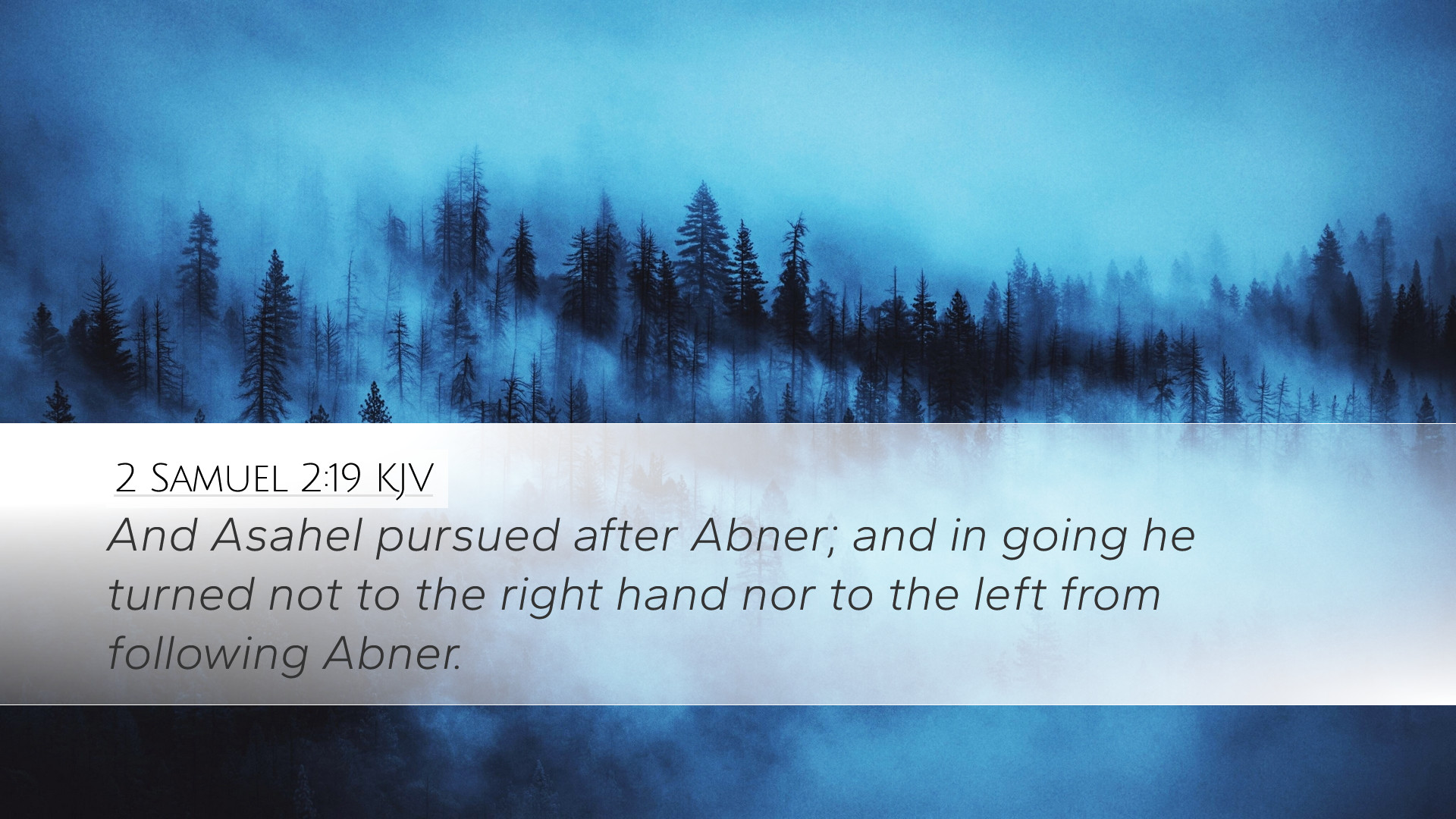Commentary on 2 Samuel 2:19
This passage from 2 Samuel 2:19 reads: "And Asahel pursued after Abner; and in going, he turned not to the right hand nor to the left from following Abner." At first glance, this verse speaks to themes of determination and pursuit, yet it also reflects broader theological and historical contexts that are significant for deeper study.
Contextual Background
The events of 2 Samuel occur after the death of Saul, where there is a struggle for the throne of Israel. Asahel, the brother of Joab, is depicted as a young and swift warrior, eager to prove himself. Abner, the commander of Saul's army, represents the remnants of Saul’s power.
The Perseverance of Asahel
Asahel’s relentless pursuit of Abner is critical to understanding both his character and the dynamics of the conflict. This determination is noted by several commentators:
- Matthew Henry: Comments on Asahel’s speed and focus, highlighting the bravery and vigor of youth. He suggests that Asahel’s single-minded pursuit is admirable but also hints at a rashness that stems from youthful impulsivity.
- Albert Barnes: Adds that Asahel’s pursuit shows his ambition and desire for honor, interpreting his actions as an attempt to establish his legacy in a tumultuous time.
- Adam Clarke: Emphasizes the significance of Asahel not diverting his course. Clarke argues that this unwavering pursuit can be seen as a metaphor for the Christian’s pursuit of holiness and righteousness—instead of worldly distractions.
Theological Implications
This verse, though historical, holds significant theological insights:
- Divine Providence: The events underscore God's sovereignty over Israel’s leadership. Asahel pursues Abner, yet this is within the larger divine plan that ultimately leads to the rise of David as king.
- Conflict and Leadership: The rivalry that brews reflects the human tendency to fight for power and recognition, a theme that resonates throughout Biblical history. Asahel's zealous chase of Abner symbolizes the struggles between the flesh and spiritual allegiance.
- Blind Ambition vs. Divine Purpose: Asahel's unwavering focus can be interpreted positively, yet it also serves as a caution regarding ambition detached from godly wisdom. The tragedy that follows Asahel's pursuit highlights how ambition can lead to destruction when not tempered by discernment.
The Character of Abner
Abner’s role as the one being pursued is also significant:
- Matthew Henry: Describes Abner as a reluctant adversary who realizes the futility of civil war against David. His attempt to avoid violence reflects a deeper moral struggle concerning obedience to God’s will.
- Albert Barnes: Points out that Abner's actions are guided by a desire to preserve the remnants of Saul’s influence, illustrating the complexities of leadership during a transitional period in biblical history.
- Adam Clarke: Emphasizes Abner’s strategy in navigating the conflict. His avoidance of direct confrontation with Asahel may suggest wisdom, showing that sometimes retreating is preferable over confrontation.
Lessons for Leadership and Pursuit
The account of Asahel and Abner serves as a timeless discussion on leadership, ambition, and the persistence in one's calling:
- For Pastors: This text prompts reflection on the motivations behind one's pursuits. Are they driven by a desire for personal renown or a desire to follow God's calling?
- For Students: Asahel’s determination is a call to pursue knowledge and wisdom. However, it is essential to balance fervor with discernment and direction.
- For Theologians: This passage invites analysis of the dynamics of power transitions throughout scripture, urging a deeper understanding of historical inferences and their implications for current theological interpretations.
- For Bible Scholars: The narrative raises inquiries regarding the historical context of leadership struggles in ancient Israel, giving insight into societal norms and the emotional landscape of the time.
Conclusion
In summary, 2 Samuel 2:19 encapsulates a moment rich with implications for character, ambition, and the nature of leadership. By examining the perspectives of Asahel and Abner, we can draw lessons relevant for various aspects of faith and practice. This passage challenges readers to pursue their spiritual goals with unyielding commitment while remaining anchored in wisdom and godliness.


